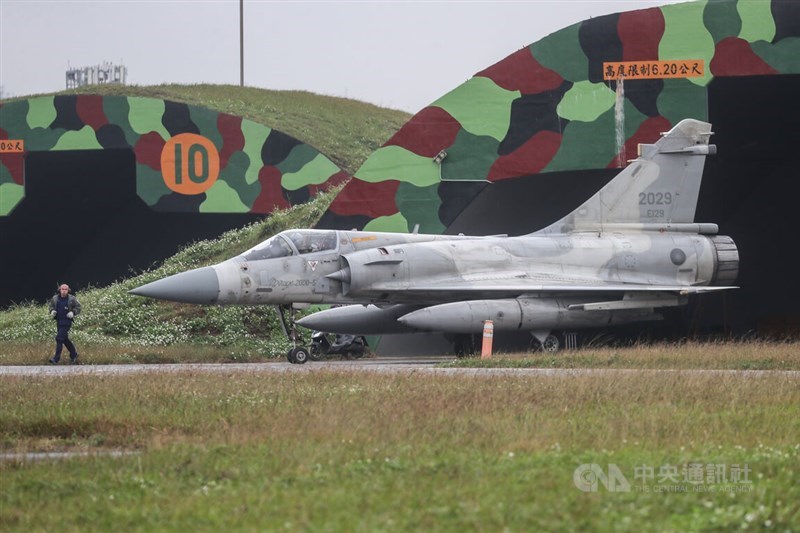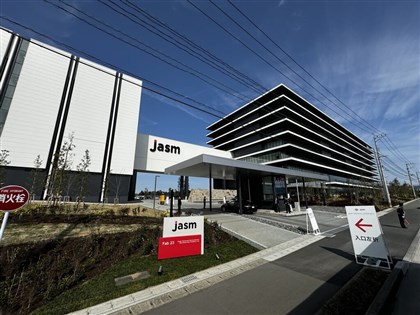ANALYSIS/Experts challenge official's assertion of Taiwan's 'absolute' air superiority

By Sean Lin, CNA staff reporter
With tensions in the Taiwan Strait showing no signs of easing, a recent remark by Taiwan's deputy defense minister Po Horng-huei (柏鴻輝) asserting that Taiwan's forces would have "absolute air superiority" over the Chinese Air Force in a conflict has sparked heated discussions and raised some eyebrows.
While not rejecting Po's remarks outright, military experts who weighed in on the issue were less optimistic when it comes to Taiwan's ability to defend its airspace and highlighted potential threats in Taiwan's overall defense picture.
At a legislative hearing on March 11, Po said in response to a lawmaker's question that Taiwan had "absolute air superiority" over Chinese warplanes "within striking range of our (Taiwan's) firepower."
The deputy defense minister also agreed with the lawmaker's statement that Taiwan's better trained pilots could counter the numerical advantage the Chinese Air Force has.
Po's surprising assessment sparked animated discussions soon after it was reported by the media, with some netizens calling his comment "interesting" while others questioned his views.
Among those skeptical about Po's assessment was Derek Grossman, a senior defense analyst at RAND Corporation, who shared the news story on social media platform X (formerly Twitter) with the words, "You sure?"
Dynamic command of the air
Lin Ying-yu (林穎佑), an assistant professor at Tamkang University Graduate Institute of International Affairs and Strategic Studies, noted that while People's Liberation Army (PLA) aircraft are within striking range of Taiwan's air defense systems, Taiwan's fighter jets are also in range of China's air defense systems.
The range of surface-to-air defense missiles on both sides covers the entire Taiwan Strait, he explained.
As such, he argued, Taiwan's command of the air, just like China's, is not "absolute," but "partial," and only exists within the airspace above its territorial waters which extend 12 nautical miles from its shores.
According to Lin, command of the air is dynamic. Although both sides have partial command of their respective airspace during peacetime, both sides would seek to establish air supremacy over the other during a war.
With China's unending saber-rattling around Taiwan, most people in the island nation have a lingering, yet very real fear that tensions could lead to a skirmish erupting between Taiwan and China, or that China could launch an incursion into Taiwanese territory.
Since 2016, the same year President Tsai Ing-wen (蔡英文) of the independence-leaning Democratic Progressive Party (DPP) took office, China has continued ramping up military pressure on Taiwan, culminating in two Chinese J-11 fighter jets crossing the Taiwan Strait median line on March 31, 2019.
The incursion across what was then considered a tacit boundary between the two sides prompted Taipei to scramble fighter jets to shadow and warn off the intruders.
Beijing's move drew stern condemnation from Taiwan. However, Chinese naval operations in waters around Taiwan and Chinese military aircraft crossing the median line now occur on an almost daily basis.
Dec. 20: Chinese balloon detected flying over Taiwan Strait median line: MND
Nov. 1: Dozens of PLA planes detected near Taiwan amid aircraft carrier drills
Defender's advantage
Tony Hu (胡振東), a former Pentagon official, agreed that Taiwan had air superiority over the Chinese Air Force in its airspace due in large part to Taiwan's defensive posture.
"Regarding defending the airspace, it doesn't always have to be airplane against airplane. It could be surface-launched missiles against the airplane and in that scenario, the intruder has to face both but the defender has both," Hu said. "So the defender always has an advantage."
Taiwan has a robust and layered air defense system that includes the MIM-104 Patriot missiles, the Tien-Kung missiles, the Skyguard and Phalanx air defense systems, and laser-guided anti-aircraft guns, Hu said.
These capabilities mean Chinese aircraft "will be having a hard time trying to establish air superiority" in Taiwan's airspace, he added.
However, Hu said he would not be comfortable describing Taiwan's advantage over intruding PLA aircraft as "absolute air superiority," as there might be times when China gains temporary control of the air.
Chieh Chung (揭仲), an associate research fellow with the National Policy Foundation in Taipei, agreed that Taiwan's powerful integrated air defense systems coupled with its C4ISR -- Command, Control, Communications, Computers, Intelligence, Surveillance, and Reconnaissance -- capabilities give it an advantage over PLA aircraft in air defense operations.
This, Chieh said, would motivate the PLA to target Taiwan's key infrastructure such as runways, radar stations, and communication systems, in addition to paralyzing the armed forces' Joint Operations Command Center. By doing so it could prevent Taiwan from conducting joint operations and stop Taiwan's fighter jets from taking off or landing, thereby weakening Taiwan's air defense capabilities.
This is why he would refrain from using the term "absolute air superiority" because any advantage Taiwan has in air defense warfare relies on such infrastructure functioning well, he said.
Taiwan pilots' strength
Regarding Po's remark that Taiwan would be able to counter the Chinese Air Force's numerical advantage with better trained pilots, Hu -- a former U.S. Air Force officer -- said that the remark made sense because air combat is a situation where the ability of a pilot to take out multiple enemy pilots is put to the test.
During his trip to Morris Air National Guard Base in the U.S. in July 2023, the 21st Fighter Squadron consisting of Taiwanese pilots training to fly the F-16V jets had just won the annual "Turkey Shoot" -- a training competition in which pilots from all squadrons aim to hit simulated airborne and land-based targets -- beating all other American and foreign F-16 pilots on the base.
This speaks to the quality of Taiwanese pilots, Hu said, adding that it was not the first time Taiwanese pilots had defeated their foreign counterparts in training competitions.
Lin said that while he has faith in Taiwan's fighter jet pilots, Taiwan should develop a joint air defense strategy around its flagship F-16V fighter jets by engaging different services in its armed forces if it is to effectively counter the Chinese Air Force's numerical advantage.
Narrowing gap between Taiwan and China pilots
Chieh said that Po's remark about pilot quality over quantity was plausible, but cautioned that the ability gap between Taiwanese and Chinese pilots has been narrowing in recent years.
An indication of this, he said, is that Chinese fighter jets have recently been undertaking long-distance sorties typically reserved for more experienced pilots.
With the frequent incursions by PLA planes and unmanned aerial vehicles into the airspace around Taiwan proper, Chieh said he worried that Taiwan's seasoned pilots would be too preoccupied or exhausted from monitoring the frequent fly-bys of PLA aircraft and might not have the time or energy to train the next generation of fighter jet pilots.
Taiwan should work to keep the turnover and retirement rate of seasoned pilots in check and ensure that new pilots are adequately trained, he said.
"We must find ways to maintain the quality of the [Air Force] troops and then address our weaknesses -- for example, the runaway problem -- and boost the survivability of our joint air defense system when it's under Chinese attack, which in turn will ease the pressure on pilots," Chieh said.
Enditem/kb
Realted News
March 4: Taiwan's annual live-fire drills to increase in frequency: Source
Oct. 20: China ramped up pressure against Taiwan in 2022: Pentagon
![Optimism high for Taiwan-Japan semiconductor tie-up, but concerns lurk]() Optimism high for Taiwan-Japan semiconductor tie-up, but concerns lurkThe opening of Taiwan Semiconductor Manufacturing Co.'s (TSMC) first fab in Japan in February brought great optimism over the new Taiwan-Japan semiconductor alliance and the prospects for reciprocal collaboration between the two sides.03/26/2024 06:07 PM
Optimism high for Taiwan-Japan semiconductor tie-up, but concerns lurkThe opening of Taiwan Semiconductor Manufacturing Co.'s (TSMC) first fab in Japan in February brought great optimism over the new Taiwan-Japan semiconductor alliance and the prospects for reciprocal collaboration between the two sides.03/26/2024 06:07 PM![Philippine port expansion would help Taiwan in cross-strait conflict: Experts]() Philippine port expansion would help Taiwan in cross-strait conflict: ExpertsA United States-funded project to expand a Philippine civilian port facing a strategically crucial channel could assist U.S. allies in the Pacific, including Taiwan, in the event of a conflict with China, military experts have said.03/13/2024 09:03 PM
Philippine port expansion would help Taiwan in cross-strait conflict: ExpertsA United States-funded project to expand a Philippine civilian port facing a strategically crucial channel could assist U.S. allies in the Pacific, including Taiwan, in the event of a conflict with China, military experts have said.03/13/2024 09:03 PM![KMT vice president pick could be double-edged sword, analysts warn]() KMT vice president pick could be double-edged sword, analysts warn"If elected, I won't be a voiceless vice president," declared Jaw Shau-kong (趙少康), the once political "golden boy," shortly after being named as the Kuomintang's (KMT) vice presidential candidate on the last day of registration for Taiwan's 2024 presidential election.11/29/2023 06:16 PM
KMT vice president pick could be double-edged sword, analysts warn"If elected, I won't be a voiceless vice president," declared Jaw Shau-kong (趙少康), the once political "golden boy," shortly after being named as the Kuomintang's (KMT) vice presidential candidate on the last day of registration for Taiwan's 2024 presidential election.11/29/2023 06:16 PM
- Cross-Strait
KMT caucus whip meets with senior Chinese officials in Beijing
04/27/2024 09:54 PM - Society
Hundreds of protesters in Taipei call for better child protection
04/27/2024 09:18 PM - Society
- Culture
Taiwan XR film wins first prize at Paris NewImages Festival
04/27/2024 07:20 PM - Cross-Strait
12 PLA planes cross Taiwan Strait median line: Defense ministry
04/27/2024 05:17 PM



